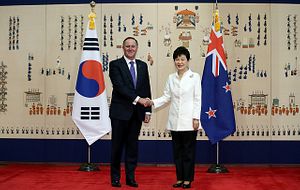On Tuesday, New Zealand Prime Minister John Key wrapped up a three-day visit to South Korea during which he signed a free trade agreement. As might be expected, the South Korean media covered the visit, focusing mainly on the removal of tariffs and New Zealand’s cooperation in denuclearizing North Korea.
But there was one striking omission from the local media coverage: revelations that the New Zealand authorities had spied on a former South Korean trade minister when he was a candidate for the top job at the World Trade Organization.
Within a day of Key’s arrival in Seoul on Sunday, the New Zealand Herald and The Intercept reported that the Government Communications Security Bureau had monitored emails and other Internet traffic referring to the nine candidates for WTO director general in 2013, including South Korea’s Bark Tae-ho. The reports alleged that the GCSB had used the NSA’s XKEYSCORE eavesdropping program to look at the communications in an apparent attempt to secure the job for the New Zealand candidate, Tim Groser. The reports referred to a secret XKEYSCORE document in support of the claims.
But in South Korea, news outlets almost completely ignored the revelations, even as they coincided with the prime minister’s visit. No major local media outlet made any reference to the spying angle. The only apparent mention came at the bottom of a single article on one local news site.
In contrast, various New Zealand media, in South Korea for Key’s trip, covered the spying revelations, portraying them as putting a damper on the FTA signing.
One Television New Zealand reporter told The Korea Observer that her media organization had asked Key about the claims in the presence of local journalists.
“There was no perceptible reaction from the local journos but they didn’t have a chance to react to the revelation because they’d already exhausted their question,” said Heather du Plessis-Allan. (Disclosure: this author also wrote the Korea Observer piece.)
In an apparent echo of the local media’s stance, Key told the network the Korean side hadn’t raised the issue “because they wouldn’t give a monkey’s. And they probably wouldn’t believe it.”
Lee Ki-jun, a journalist with Newsweek Korea, told The Diplomat that the public and media alike apparently failed to appreciate the significance of the charges, possibly because they involve a small, distant country.
“But if it was Japan, they would be outraged and definitely (have) covered it (even) if it happened 20 years ago,” he said, referring to the sensitivity many Koreans feel toward Japan due to historical and territorial disputes.
Geoffrey Cain, Korea correspondent for GlobalPost since 2012, also found the lack of coverage noteworthy.
“New Zealand-Korea relations are obscure and, understandably, wouldn’t get much coverage,” he told The Diplomat. “But it’s incredibly odd that the Korean press would remain silent about some pretty serious espionage allegations against their government. Korean journalists have all sorts of restraints imposed by their press clubs, which are tied to ministries and companies. There’s an incentive not to rock the boat.”































